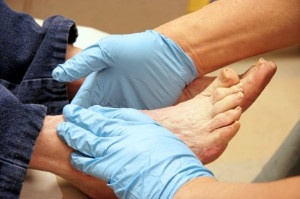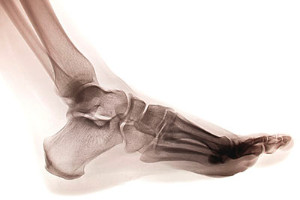Items filtered by date: February 2017
Tarsal Tunnel Syndrome Suspected Cause of Leader's Limp
 North Korean leader Kim Jong Un was recently seen limping in public, possibly due to his history of suffering from tarsal tunnel syndrome. The condition arises from the compression of the tibial nerve in the foot. The occurrence itself happened during a broadcasted report on the leader’s inspection visit to North Korea’s Kangwon Province. Symptoms of tarsal tunnel syndrome include a burning pain at the sole of the foot, numbness, or tingling. Treatment for tarsal tunnel syndrome may include anti-inflammatory medications and orthotics.
North Korean leader Kim Jong Un was recently seen limping in public, possibly due to his history of suffering from tarsal tunnel syndrome. The condition arises from the compression of the tibial nerve in the foot. The occurrence itself happened during a broadcasted report on the leader’s inspection visit to North Korea’s Kangwon Province. Symptoms of tarsal tunnel syndrome include a burning pain at the sole of the foot, numbness, or tingling. Treatment for tarsal tunnel syndrome may include anti-inflammatory medications and orthotics.
Tarsal tunnel syndrome can be very uncomfortable to live with. If you are experiencing tarsal tunnel syndrome, contact Harvey Jacobs, DPM of Quality Foot Care Center. Our doctor can provide the care you need to keep you pain-free and on your feet.
Tarsal Tunnel Syndrome
Tarsal tunnel syndrome, which can also be called tibial nerve dysfunction, is an uncommon condition of misfiring peripheral nerves in the foot. The tibial nerve is the peripheral nerve in the leg responsible for sensation and movement of the foot and calf muscles. In tarsal tunnel syndrome, the tibial nerve is damaged, causing problems with movement and feeling in the foot of the affected leg.
Common Cause of Tarsal Tunnel Syndrome
- Involves pressure or an injury, direct pressure on the tibial nerve for an extended period of time, sometimes caused by other body structures close by or near the knee.
- Diseases that damage nerves, including diabetes, may cause tarsal tunnel syndrome.
- At times, tarsal tunnel syndrome can appear without an obvious cause in some cases.
The Effects of Tarsal Tunnel Syndrome
- Different sensations, an afflicted person may experience pain, tingling, burning or other unusual sensations in the foot of the affected leg.
- The foot muscles, toes and ankle become weaker, and curling your toes or flexing your foot can become difficult.
- If condition worsens, infections and ulcers may develop on the foot that is experiencing the syndrome.
A physical exam of the leg can help identify the presence of tarsal tunnel syndrome. Medical tests, such as a nerve biopsy, are also used to diagnose the condition. Patients may receive physical therapy and prescriptive medication. In extreme cases, some may require surgery.
If you have any questions please feel free to contact our office located in Somerset, NJ . We offer the newest diagnostic and treatment technologies for all your foot and ankle needs.
Tarsal Tunnel Syndrome Suspected Cause of Leader's Limp
 North Korean leader Kim Jong Un was recently seen limping in public, possibly due to his history of suffering from tarsal tunnel syndrome. The condition arises from the compression of the tibial nerve in the foot. The occurrence itself happened during a broadcasted report on the leader’s inspection visit to North Korea’s Kangwon Province. Symptoms of tarsal tunnel syndrome include a burning pain at the sole of the foot, numbness, or tingling. Treatment for tarsal tunnel syndrome may include anti-inflammatory medications and orthotics.
North Korean leader Kim Jong Un was recently seen limping in public, possibly due to his history of suffering from tarsal tunnel syndrome. The condition arises from the compression of the tibial nerve in the foot. The occurrence itself happened during a broadcasted report on the leader’s inspection visit to North Korea’s Kangwon Province. Symptoms of tarsal tunnel syndrome include a burning pain at the sole of the foot, numbness, or tingling. Treatment for tarsal tunnel syndrome may include anti-inflammatory medications and orthotics.
Tarsal tunnel syndrome can be very uncomfortable to live with. If you are experiencing tarsal tunnel syndrome, contact one of our podiatrists of Quality Foot Care Center. Our doctors can provide the care you need to keep you pain-free and on your feet.
Tarsal Tunnel Syndrome
Tarsal tunnel syndrome, which can also be called tibial nerve dysfunction, is an uncommon condition of misfiring peripheral nerves in the foot. The tibial nerve is the peripheral nerve in the leg responsible for sensation and movement of the foot and calf muscles. In tarsal tunnel syndrome, the tibial nerve is damaged, causing problems with movement and feeling in the foot of the affected leg.
Common Cause of Tarsal Tunnel Syndrome
- Involves pressure or an injury, direct pressure on the tibial nerve for an extended period of time, sometimes caused by other body structures close by or near the knee.
- Diseases that damage nerves, including diabetes, may cause tarsal tunnel syndrome.
- At times, tarsal tunnel syndrome can appear without an obvious cause in some cases.
The Effects of Tarsal Tunnel Syndrome
- Different sensations, an afflicted person may experience pain, tingling, burning or other unusual sensations in the foot of the affected leg.
- The foot muscles, toes and ankle become weaker, and curling your toes or flexing your foot can become difficult.
- If condition worsens, infections and ulcers may develop on the foot that is experiencing the syndrome.
A physical exam of the leg can help identify the presence of tarsal tunnel syndrome. Medical tests, such as a nerve biopsy, are also used to diagnose the condition. Patients may receive physical therapy and prescriptive medication. In extreme cases, some may require surgery.
If you have any questions please feel free to contact our office located in Somerset, NJ. We offer the newest diagnostic and treatment technologies for all your foot and ankle needs.
Read more about Tarsal Tunnel SyndromeOccurrence of Diabetic Foot Ulcers Likely to Rise
 According to GlobalData, a data-driven consulting company, the amount of people with diabetic foot ulcers is rising and is likely to continue to rise going forward. In the seven major markets focused on in the epidemiology report (US, France, Germany, Italy, Spain, UK, and Japan), the trends were clear. The projected annual growth rate of both new cases of diabetic foot ulcers and repeat cases is north of 4%. The likelihood of having diabetic foot ulcers when you have diabetes increases if you live in a developing country, as opposed to a developed one. It is very important to be mindful of your feet when you have diabetes. Always check for sores and be conscious of any type of numbness.
According to GlobalData, a data-driven consulting company, the amount of people with diabetic foot ulcers is rising and is likely to continue to rise going forward. In the seven major markets focused on in the epidemiology report (US, France, Germany, Italy, Spain, UK, and Japan), the trends were clear. The projected annual growth rate of both new cases of diabetic foot ulcers and repeat cases is north of 4%. The likelihood of having diabetic foot ulcers when you have diabetes increases if you live in a developing country, as opposed to a developed one. It is very important to be mindful of your feet when you have diabetes. Always check for sores and be conscious of any type of numbness.
Diabetic foot care is important in preventing foot ailments such as ulcers. If you are suffering from diabetes or have any other concerns about your feet, contact Harvey Jacobs, DPM from Quality Foot Care Center. Our doctor can provide the care you need to keep you pain-free and on your feet.
Diabetic Foot Care
Diabetes affects millions of people every year. The condition can damage blood vessels in many parts of the body, especially the feet. Because of this, taking care of your feet is essential if you have diabetes, and having a podiatrist help monitor your foot health is highly recommended.
The Importance of Caring for Your Feet
- Routinely inspect your feet for bruises or sores.
- Wear socks that fit your feet comfortably.
- Wear comfortable shoes that provide adequate support.
Patients with diabetes should have their doctor monitor their blood levels, as blood sugar levels play such a huge role in diabetic care. Monitoring these levels on a regular basis is highly advised.
It is always best to inform your healthcare professional of any concerns you may have regarding your feet, especially for diabetic patients. Early treatment and routine foot examinations are keys to maintaining proper health, especially because severe complications can arise if proper treatment is not applied.
If you have any questions please feel free to contact our office located in Somerset, NJ . We offer the newest diagnostic and treatment technologies for all your foot and ankle needs.
Occurrence of Diabetic Foot Ulcers Likely to Rise
 According to GlobalData, a data-driven consulting company, the amount of people with diabetic foot ulcers is rising and is likely to continue to rise going forward. In the seven major markets focused on in the epidemiology report (US, France, Germany, Italy, Spain, UK, and Japan), the trends were clear. The projected annual growth rate of both new cases of diabetic foot ulcers and repeat cases is north of 4%. The likelihood of having diabetic foot ulcers when you have diabetes increases if you live in a developing country, as opposed to a developed one. It is very important to be mindful of your feet when you have diabetes. Always check for sores and be conscious of any type of numbness.
According to GlobalData, a data-driven consulting company, the amount of people with diabetic foot ulcers is rising and is likely to continue to rise going forward. In the seven major markets focused on in the epidemiology report (US, France, Germany, Italy, Spain, UK, and Japan), the trends were clear. The projected annual growth rate of both new cases of diabetic foot ulcers and repeat cases is north of 4%. The likelihood of having diabetic foot ulcers when you have diabetes increases if you live in a developing country, as opposed to a developed one. It is very important to be mindful of your feet when you have diabetes. Always check for sores and be conscious of any type of numbness.
Diabetic foot care is important in preventing foot ailments such as ulcers. If you are suffering from diabetes or have any other concerns about your feet, contact one of our podiatrists from Quality Foot Care Center. Our doctors can provide the care you need to keep you pain-free and on your feet.
Diabetic Foot Care
Diabetes affects millions of people every year. The condition can damage blood vessels in many parts of the body, especially the feet. Because of this, taking care of your feet is essential if you have diabetes, and having a podiatrist help monitor your foot health is highly recommended.
The Importance of Caring for Your Feet
- Routinely inspect your feet for bruises or sores.
- Wear socks that fit your feet comfortably.
- Wear comfortable shoes that provide adequate support.
Patients with diabetes should have their doctor monitor their blood levels, as blood sugar levels play such a huge role in diabetic care. Monitoring these levels on a regular basis is highly advised.
It is always best to inform your healthcare professional of any concerns you may have regarding your feet, especially for diabetic patients. Early treatment and routine foot examinations are keys to maintaining proper health, especially because severe complications can arise if proper treatment is not applied.
If you have any questions please feel free to contact our office located in Somerset, NJ. We offer the newest diagnostic and treatment technologies for all your foot and ankle needs.
Read more about How to Care for Diabetic FootISU Sophomore Returns After Stress Fracture
 Illinois State sophomore David Ndiaye is ready to return to the basketball court after suffering a stress fracture in his right foot. The injury caused him to miss the first nine games the season. According to Illinois State University coach Dan Muller, great expectations ride on the 7-foot tall athlete. "He was, by far, our best performer and competitor for what is expected of him," said Muller. "I thought he battled, rebounded and guarded. He was really good defensively. He missed a couple shots around the rim after he rolled. That's a little bit of inexperience, but he's playing better."
Illinois State sophomore David Ndiaye is ready to return to the basketball court after suffering a stress fracture in his right foot. The injury caused him to miss the first nine games the season. According to Illinois State University coach Dan Muller, great expectations ride on the 7-foot tall athlete. "He was, by far, our best performer and competitor for what is expected of him," said Muller. "I thought he battled, rebounded and guarded. He was really good defensively. He missed a couple shots around the rim after he rolled. That's a little bit of inexperience, but he's playing better."
Activities where too much pressure is put on the feet can cause stress fractures. To learn more, contact Harvey Jacobs, DPM from Quality Foot Care Center. Our doctor can provide the care you need to keep your pain free and on your feet.
Dealing with Stress Fractures of the Foot and Ankle
Stress fractures occur in the foot and ankle when muscles in these areas weaken from too much or too little use. The feet and ankles then lose support when walking or running from the impact of the ground. Since there is no protection, the bones receive the full impact of each step. Stress on the feet can cause cracks to form in the bones, thus creating stress fractures.
What Are Stress Fractures?
Stress fractures occur frequently in individuals whose daily activities cause great impact on the feet and ankles. Stress factors are most common among:
- Runners
- People affected with Osteoporosis
- Tennis or basketball players
- Gymnasts
- High impact workouts
Symptoms
Pain from the fractures occur in the area of the fractures and can be constant or intermittent. It will often cause sharp or dull pain with swelling and tenderness. Engaging in any kind of activity which involves high impact will aggravate pain.
If you have any questions please feel free to contact our office located in Somerset, NJ . We offer the newest diagnostic and treatment technologies for all your foot and ankle needs.
ISU Sophomore Returns After Stress Fracture
 Illinois State sophomore David Ndiaye is ready to return to the basketball court after suffering a stress fracture in his right foot. The injury caused him to miss the first nine games the season. According to Illinois State University coach Dan Muller, great expectations ride on the 7-foot tall athlete. "He was, by far, our best performer and competitor for what is expected of him," said Muller. "I thought he battled, rebounded and guarded. He was really good defensively. He missed a couple shots around the rim after he rolled. That's a little bit of inexperience, but he's playing better."
Illinois State sophomore David Ndiaye is ready to return to the basketball court after suffering a stress fracture in his right foot. The injury caused him to miss the first nine games the season. According to Illinois State University coach Dan Muller, great expectations ride on the 7-foot tall athlete. "He was, by far, our best performer and competitor for what is expected of him," said Muller. "I thought he battled, rebounded and guarded. He was really good defensively. He missed a couple shots around the rim after he rolled. That's a little bit of inexperience, but he's playing better."
Activities where too much pressure is put on the feet can cause stress fractures. To learn more, contact one of our podiatrists from Quality Foot Care Center. Our doctors can provide the care you need to keep your pain free and on your feet.
Dealing with Stress Fractures of the Foot and Ankle
Stress fractures occur in the foot and ankle when muscles in these areas weaken from too much or too little use. The feet and ankles then lose support when walking or running from the impact of the ground. Since there is no protection, the bones receive the full impact of each step. Stress on the feet can cause cracks to form in the bones, thus creating stress fractures.
What Are Stress Fractures?
Stress fractures occur frequently in individuals whose daily activities cause great impact on the feet and ankles. Stress factors are most common among:
- Runners
- People affected with Osteoporosis
- Tennis or basketball players
- Gymnasts
- High impact workouts
Symptoms
Pain from the fractures occur in the area of the fractures and can be constant or intermittent. It will often cause sharp or dull pain with swelling and tenderness. Engaging in any kind of activity which involves high impact will aggravate pain.
If you have any questions please feel free to contact our office located in Somerset, NJ. We offer the newest diagnostic and treatment technologies for all your foot and ankle needs.
Read more about Dealing with Stress Fractures of the Foot and Ankle